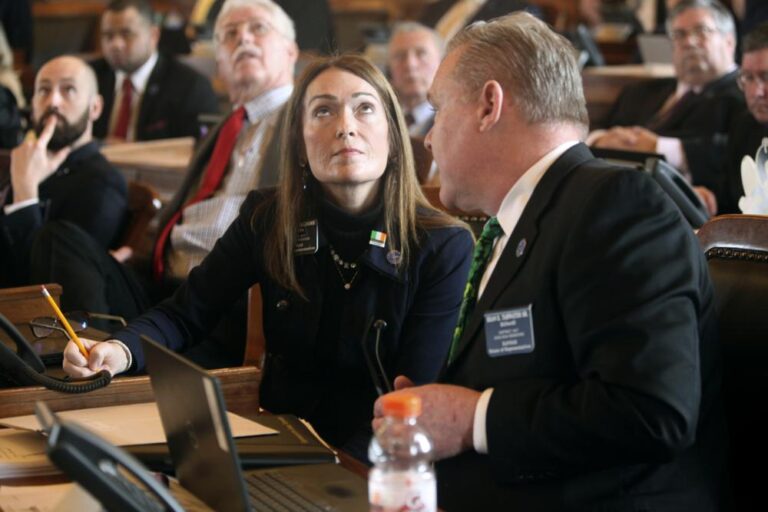TOPEKA, Kan. (AP) — Conservative Republicans in Kansas hoping to earmark state education dollars for helping parents pay for private schooling are struggling to win over enough rural and moderate GOP colleagues to get a law enacted, in sharp contrast to debates in neighboring states.
The Kansas House on Tuesday approved, 64-61, a bill creating a program that would give thousands of parents $5,150 for each child they want to move into home or private schools, starting in the 2024-25 school year. And last month, the Kansas Senate voted 22-16 to approve a bill that would expand an existing program providing income tax credits to donors who contribute to funds granting private school scholarships to students who are considered at risk of failing in public schools.
Republicans hold two-thirds majorities in both chambers, which is what would be necessary to override an expected veto from Democratic Gov. Laura Kelly. But moderate Republicans and many rural GOP lawmakers oppose the measures, leaving supporters well short of being able to overturn a veto.
In the House, supporters of its “education savings accounts” bill hoped to push Kelly into accepting it by bundling it with her proposal to increase spending on public schools’ special education programs by 14%, or $72 million, and by directing school districts to increase teachers’ pay. Kelly has said repeatedly that she believes state education dollars ought to go to public K-12 schools.
“I don’t really react very well to game-playing or bribery or whatever you want to call it,” Kelly told reporters after the House vote.
The debate in Kansas comes with Republican legislators in at least a dozen other states pushing “school choice” measures. Iowa lawmakers approved a law in January to provide state tax dollars to parents who want to send their children to public schools. And a proposal to create an income tax credit to funders of private school scholarships appears to have enough support in the Nebraska Legislature to pass.
But in Kansas, before a bill can go to Kelly’s desk, conservative Republicans must themselves agree on the final version of a single bill. After the House vote Tuesday, the next step is negotiations between three senators and three House members.
State Rep. Kristey Williams, a Wichita-area Republican who chairs a House committee on K-12 spending and is likely to be its lead negotiator, said the plan for education savings accounts has support in the Senate. But Senate Education Committee Chair Molly Baumgardner, a Kansas City-area Republican and likely her chamber’s top negotiator said, “They gutted our bill.”
Conservative Republicans across the U.S. have argued that states’ education dollars ought to fund individual students’ educations, not “systems.” They argue that many parents would remove their children from failing public schools if they could afford to and that public schools simply aren’t a good fit for some children.
“If we do school choice, not only do we increase the competition in the school space, we put the parents firmly in the driver’s seat,” Republican state Rep. Patrick Penn, of Wichita, said during a news conference earlier this week.
But Kelly, her fellow Democrats and education groups argue that such proposals are designed to weaken public schools, especially when they divert their funds to paying for private or home schooling. Some critics also argue that there will huge additional costs when parents who already have kids in private schools take advantage.
“I don’t even know where to start,” Lauren Tice, a lobbyist for the state’s largest teachers’ union and a member of a local Topeka-area school board, said of the union’s objections. “Nobody can predict what kind of fiscal impact this will have.”
Moderate Republicans in Kansas have long been skeptical of school choice initiatives, but they’ve been joined this year by rural Republicans who don’t believe those measure have anything to offer areas with few or no private schools. They said public schools often are the heart of small communities.
“Frankly, the home schoolers in my district want the government to stay out of their living room,” said state Rep. Bill Clifford, a Republican from southwestern Kansas. “They were very resistant.”
The House’s measure would at first limit education savings accounts to students who are considered at risk of failing or who are at least one grade level behind in reading and math, as well as another 2,000 from working-class or middle-class families. The program would expand over three years so that students could be eligible if they are in a family of four with an income of up to $180,000 a year.
After the House vote, Williams said that she hopes Kelly will have “an open mind” about its measure, arguing that it represents “meeting in the middle.”
“This is really about helping disadvantaged kids,” Williams said.
___
Follow John Hanna on Twitter: https://twitter.com/apjdhanna



